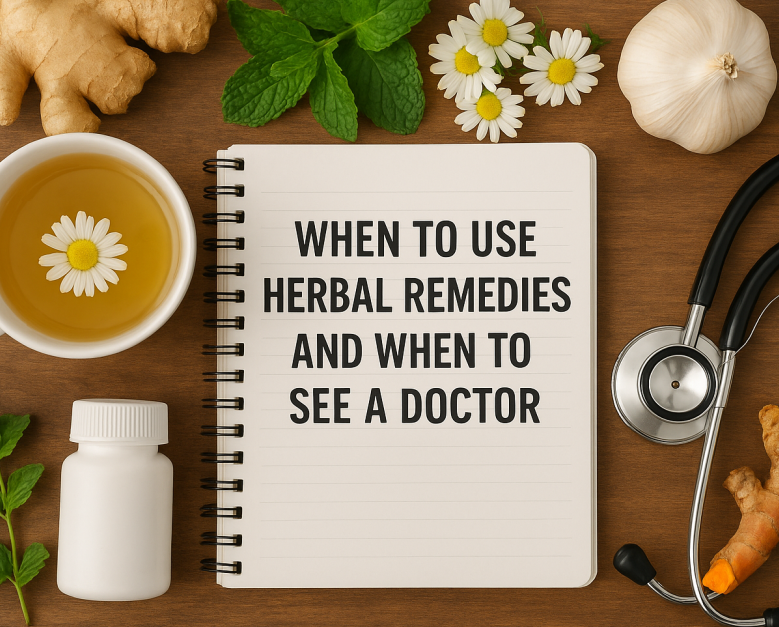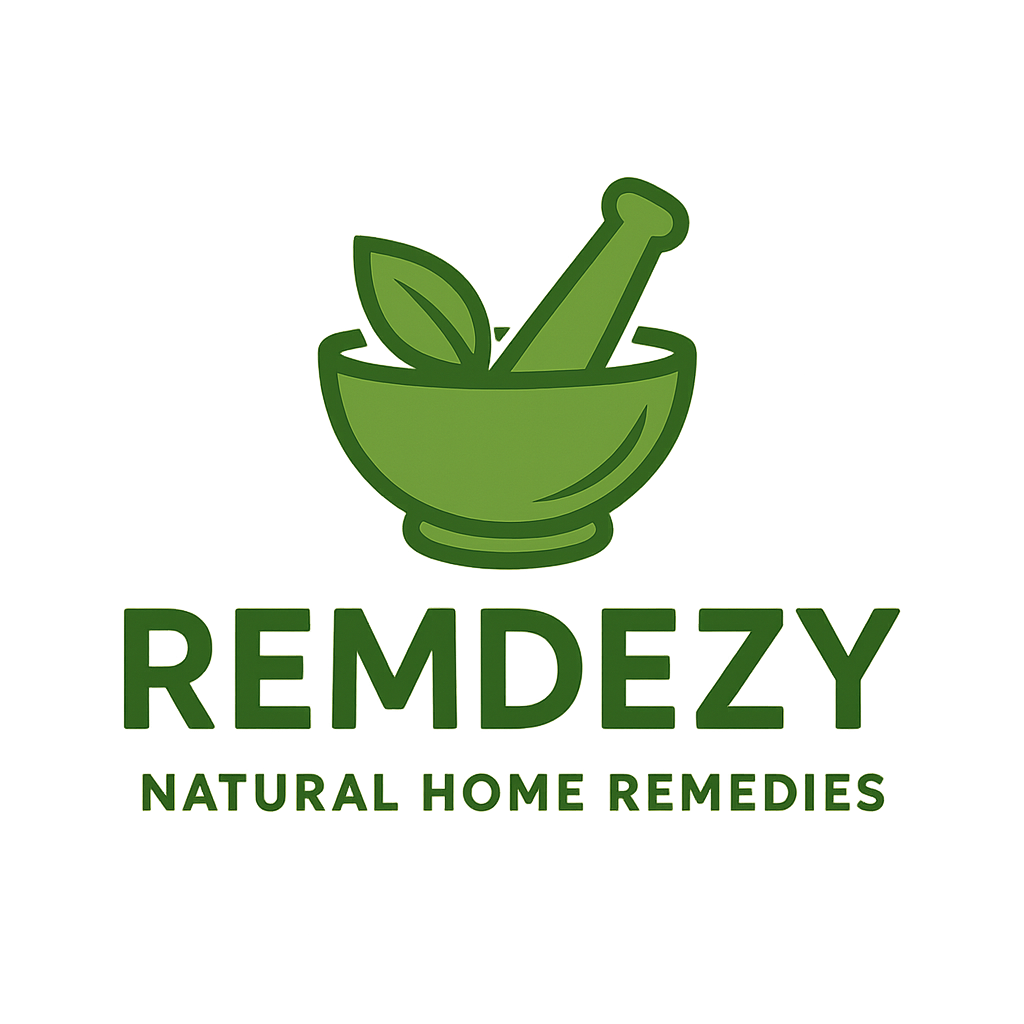When To Use Herbal Remedies And When To See A Doctor

In today’s fast-paced world, more people are looking for natural ways to support their health. Herbal remedies, passed down for generations, have become increasingly popular as individuals search for safer, gentler alternatives to pharmaceuticals. However, one crucial question remains: When should you use herbal remedies, and when is it time to see a doctor?
Understanding the difference can help you make informed decisions about your health, avoid unnecessary risks, and ensure you’re getting the care you need. In this guide, we’ll explore the benefits of herbal remedies, their limitations, and clear signs that professional medical help is necessary.
The Growing Appeal of Herbal Remedies
Herbal remedies are plant-based treatments used to support wellness and manage various conditions. They include teas, tinctures, powders, and capsules made from roots, leaves, seeds, or flowers. Some of the most common herbs include:
- Ginger for nausea and digestion.
- Garlic for heart health and immune support.
- Turmeric for inflammation.
- Chamomile for relaxation and sleep.
- Echinacea for colds and immune strength.
The appeal of these remedies lies in their accessibility, affordability, and reputation for fewer side effects compared to synthetic drugs. Many people also feel a sense of empowerment when using natural remedies as part of their self-care routine.
When To Use Herbal Remedies
While herbs can’t replace professional medical care in all cases, they can be a safe and effective option for everyday concerns and preventive health. Here are some situations where herbal remedies may be helpful:
1. Mild Digestive Upsets
Herbs like peppermint, ginger, and fennel are well-known for soothing bloating, indigestion, and nausea. A cup of peppermint tea or ginger chew can be an excellent first line of relief.
2. Stress and Sleep Support
Chamomile, valerian root, and passionflower are traditionally used to calm the nervous system and encourage restful sleep. For those dealing with mild anxiety or occasional insomnia, these remedies may provide gentle relief.
3. Boosting Immunity During Cold Season
Echinacea, elderberry, and garlic are popular choices for supporting the immune system. While they may not prevent illness entirely, they can sometimes reduce the duration or severity of symptoms.
4. Minor Aches and Inflammation
Turmeric and ginger contain anti-inflammatory compounds that may ease mild joint pain or stiffness. These can be helpful as a complement to lifestyle measures like exercise and stretching.
5. Everyday Wellness and Prevention
Herbs like green tea (rich in antioxidants) and ashwagandha (used for stress balance) are commonly taken for overall health and energy.
Tip: When using herbal remedies, start small, use products from trusted sources, and track how your body responds. Natural does not always mean risk-free.
Limitations of Herbal Remedies
While herbs can be valuable, they are not a cure-all. Here are some important considerations:
- Slower results: Herbal remedies may take days or weeks to show noticeable effects.
- Quality varies: Unlike prescription drugs, herbal supplements are not always strictly regulated, so purity and dosage can differ between brands.
- Potential interactions: Herbs can interfere with medications. For example, St. John’s Wort may reduce the effectiveness of birth control pills or antidepressants.
- Not always strong enough: Some conditions require immediate, powerful interventions that herbs simply cannot provide.
This is why knowing when to see a doctor is just as important as knowing when to brew a cup of herbal tea.
When To See a Doctor Instead
Certain health issues should never be treated solely with herbal remedies. Professional medical evaluation is crucial when symptoms are severe, persistent, or potentially life-threatening. Here are key situations where you should seek medical care:
1. High Fever or Severe Infection
If you experience a fever above 103°F, chills, or symptoms of a serious infection (such as pneumonia or a urinary tract infection), medical treatment is essential. Herbs may ease discomfort, but antibiotics or other interventions could be necessary.
2. Chest Pain or Difficulty Breathing
Chest pain, tightness, or shortness of breath should never be ignored. These could be signs of heart disease, asthma, or a pulmonary condition that needs immediate medical attention.
3. Unexplained Weight Loss or Fatigue
If you’re losing weight without trying or feel constantly exhausted despite rest, this could signal underlying issues like thyroid problems, diabetes, or even cancer. A doctor’s evaluation is critical.
4. Chronic Pain or Worsening Symptoms
While herbs may help with mild pain, ongoing or worsening pain requires a medical diagnosis to identify the root cause. Treating only with herbs may delay important care.
5. Allergic Reactions or Side Effects
Some people are sensitive to certain herbs. If you experience hives, swelling, or trouble breathing after taking an herbal product, stop immediately and seek medical help.
6. Mental Health Concerns
Mild stress may benefit from calming herbs, but depression, severe anxiety, or thoughts of self-harm require professional care, not just self-treatment.
Combining Herbal Remedies and Conventional Medicine
It’s not always a matter of choosing herbs or doctors—sometimes the best approach is a blend of both. Many people find success using herbs alongside conventional treatments under medical guidance.
For example:
- A patient with arthritis may take prescribed medication for pain but also use turmeric supplements for additional anti-inflammatory support.
- Someone with frequent colds might use echinacea tea while also following doctor-recommended steps like flu shots and proper rest.
- A person managing stress could combine therapy or medication with calming herbs like ashwagandha or lavender tea.
The key is open communication with your healthcare provider. Always let your doctor know which herbal supplements you’re using to prevent dangerous interactions.
Practical Tips for Safe Herbal Use
- Do your research. Learn about the herb, its proper dosage, and potential side effects.
- Choose reputable brands. Look for third-party testing or certifications.
- Start slow. Begin with small amounts to see how your body reacts.
- Watch for interactions. Check if your herb may affect medications you’re taking.
- Seek balance. Use herbs as part of a healthy lifestyle, not as a replacement for medical care.
Final Thoughts
Herbal remedies can be a powerful tool for supporting wellness, easing minor symptoms, and promoting prevention. They shine when used for mild digestive issues, stress, or immune support. However, they are not a replacement for professional medical care in serious situations.
Knowing when to use herbal remedies and when to see a doctor is all about balance. Use herbs responsibly for everyday health, but don’t hesitate to seek professional help when symptoms are severe, persistent, or worrisome.
Your health is your greatest asset. By blending the wisdom of nature with the expertise of modern medicine, you can enjoy the best of both worlds—safe, effective, and holistic care.

This is such an informative and well-balanced article! I really appreciate how clearly you explained the difference between when herbal remedies can be safely used and when medical care is essential. It’s easy to assume that “natural” automatically means “safe,” but your reminder about potential interactions, inconsistent quality, and the importance of professional diagnosis is incredibly valuable. I especially liked how you highlighted the complementary role herbs can play alongside conventional medicine — that thoughtful approach helps people make empowered and informed choices. The practical tips for safe herbal use, like starting slowly and choosing reputable brands, are excellent takeaways. This post encourages a healthy respect for both traditional wisdom and modern healthcare. Thank you for promoting balance, responsibility, and awareness in such a compassionate and educational way. A great reminder that true wellness blends nature, knowledge, and medical guidance!
Thank you so much for your thoughtful and encouraging comment! I’m really glad the message of balance and informed decision-making came through — that’s exactly what I hoped to convey. You’re absolutely right that “natural” doesn’t always mean risk-free, and understanding when to rely on herbal support versus when to seek medical care is key to staying safe and well. It’s wonderful to hear that the practical tips and the idea of harmony between traditional and modern approaches resonated with you. True wellness really does come from blending nature’s gifts with sound knowledge and professional guidance. I truly appreciate you taking the time to share such kind, insightful feedback!